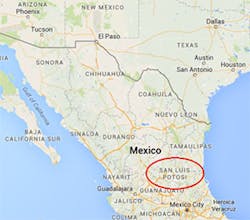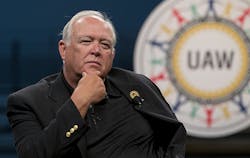Yesterday, Ford announced that it will be shifting unspecified small car manufacturing from Michigan to the San Luis Posoti region of Mexico. Production at the $1.6 billion factory is expected to begin in 2018, and employ 2,800 workers by 2020.
Ford will be mass producing at least some of its smaller vehicles in Mexico.
Photo by Massimo Bettiol/ Getty Images
It’s perfectly reasonable for an American worker to read this and become irate, and write this move off as another giant corporation cash grab to increase a CEO’s salary. That’s a lot of money to invest in a foreign country, and those are a lot of jobs not going to willing Americans, eight million of whom are unemployed.
“What would Henry Ford think about his company now?” you may ask.
Dennis Williams, president of the United Auto Workers, has already come out and called the move “very troubling.”
The U.S. advises its government personnel travel outside San Luis Potosi during daylight hours and be in their hotels by 1 a.m.
Image: Google Maps
Furthermore, Donald Trump, the man who carries around a gas can specifically to heave on fires like these, and who many of our “blue-collared” workers want as POTUS, said in a statement, "This transaction is an absolute disgrace. Our dishonest politicians and the special interests that control them are laughing in the face of all American citizens."
So taking all this into account, it’s understandable why this news would be upsetting. Should you really be that upset, though, and should that anger be directed solely toward Ford’s upper management?
We’ll present both sides of the argument, along with the facts that have been reported to far, so you can decide for yourself.
For:
- From 2011 to 2015, Ford has invested more than $10 billion in the U.S., adding 25,000 jobs. This factory represents 16% of that investment and 11% of that job total.
- Ford, which has had operations in Mexico since 1925, has 8,800 employees there, and 85,000 in the U.S.
- Trump wants to build a wall – that could cost up to $25 billion -- to keep Mexicans from coming over here and taking jobs. Creating jobs in Mexico could be a cheaper alternative, and create a more robust economy that would buy American products.
Joe Hinrichs, Ford’s president of the Americas, said:
| “Mexico has more competitive labor costs, supplier costs, good logistics, good support from the government. But importantly also, as part of our global manufacturing footprint, Mexico is a good shipping location to many countries around the world with their trade agreements.” |
Forbes writer Dale Buss believes that Williams and UAW are just reaping what their 2015 (1139-page) collective settlement agreement has sown:
|
Essentially, Williams and his lieutenants knowingly sacrificed these small-car jobs in their new labor contract, risking the long-term interests of the union and its membership for the very, very short-term payoff of wages that ended up being significantly higher than they otherwise would have obtained – and for huge profit-sharing payouts, which for the average Ford worker were a record $9,300. For Ford CEO Mark Fields, the decision to take the union’s strategy to its logical conclusion was a no-brainer. Fields has been doing a lot of things very right lately, including bringing an abrupt and rapt attention to “mobility” and self-driving technologies and scenarios in which Ford arguably wasn’t all that interested as recently as two years ago. And in deciding to follow through on a decision that long has been telegraphed, and which resulted in today’s formal announcement, Fields simply was moving in the direction in which UAW internal politics forced Ford to go. |
Against:
- There are still 8 million unemployed Americans
- This represents a 32% increase in Mexican Ford employees
- Ford received a $5.9 billion a federal funds, via a Term Asset-Backed Securities Loan Facility (TALF) loan, to upgrade their facilities to produce fuel-efficient technology.
UAW President Dennis Williams during the the 2015 contract negotiations with Ford.
Photo courtesy UAW
This is Dennis Williams statement on the Mexican plant:
| “This is another example of what’s wrong with NAFTA and why the TPP would be a disaster for the citizens of the United States. Companies continue to run to low-wage countries and import back into the United States. This is a broken system that needs to be fixed.” |
A day earlier, he wrote a rebuttal to a New York Times article lauding NAFTA’s effects on American auto industry:
|
"A fourth of American manufacturing workers make less than $11.91 an hour. America is in a vicious cycle pitting American wages versus the threat of jobs moving to Mexico at lower wages. Mr. Porter neglects to discuss why wages are so low in Mexico. Company unions there are more aligned with employers than with workers. Apologists for NAFTA often support the Trans-Pacific Partnership. Yet even TPP advocates project that the manufacturing trade deficit will increase by over $55 billion and produce 121,000 fewer manufacturing jobs by 2030." |
Lori Wallach, Director of Public Citizen’s Global Trade Watch, writes about NAFTA:
|
“Not only did promises made by NAFTA’s proponents not materialize, but many results are exactly the opposite. Such outcomes include a staggering $181 billion U.S. trade deficit with NAFTA partners Mexico and Canada and the related loss of 1 million net U.S. jobs under NAFTA, growing income inequality, displacement of more than one million Mexicancampesino farmers and a doubling of desperate immigration from Mexico, and more than $360 million paid to corporations after 'investor-state' tribunal attacks on, and rollbacks of, domestic public interest policies." |
So who, if anyone, is to blame for Americas losing out on 2,800 new auto jobs? Ford? The UAW? NAFTA?
Let us know in the comments below!
About the Author
John Hitch
Editor, Fleet Maintenance
John Hitch, based out of Cleveland, Ohio, is the editor of Fleet Maintenance, a B2B magazine that addresses the service needs for all commercial vehicle makes and models (Classes 1-8), ranging from shop management strategies to the latest tools to enhance uptime.
He previously wrote about equipment and fleet operations and management for FleetOwner, and prior to that, manufacturing and advanced technology for IndustryWeek and New Equipment Digest. He is an award-winning journalist and former sonar technician aboard a nuclear-powered submarine where he served honorably aboard the fast-attack submarine USS Oklahoma City (SSN-723).





